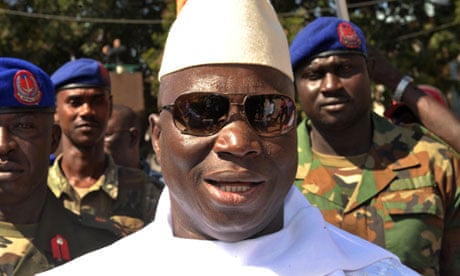Amnesty International said it had received credible reports that Gambia executed nine death-row prisoners on Friday.
The human rights organisation said eight men and one woman were removed from their prison cells and killed, and warned that dozens more executions could be imminent.
The Civil Society Associations of Gambia said it was not clear how inmates were killed. "What is however clear is that inmates were rounded up at 9.30pm on Thursday 23 August and that by the morning of 24 August, the bodies were actually lying in the Mile Two Prison yard," it said.
The Gambian government has not officially confirmed reports but a statement issued late on Friday said: "All persons on death row have been tried by the Gambian courts of competent jurisdiction and thereof convicted and sentenced to death in accordance with the law. They have exhausted all their legal rights of appeal as provided by the law."
It added: "The peace and stability of our beloved nation as regards to protection of the lives, liberty and property of individuals must at all cost be preserved and jealously guarded."
The country's president, Yahya Jammeh, announced earlier this month that all prisoners on death row would be executed by mid-September to tackle a rising crime rate and to dissuade people from committing "heinous crimes".
Speaking in a televised broadcast to mark the Muslim festival of Eid, Jammeh said: "All those guilty of serious crimes and are condemned will face the full force of the law. All punishments prescribed by law will be maintained in the country to ensure that criminals get what they deserve: that is, that those who kill are killed … By the middle of next month, all the death sentences would have been carried out to the letter."
The African Union was among those who called on Jammeh to row back on his announcement and along with the UK, French and Nigerian governments have expressed shock at the latest reports. Jammeh made a similar threat in September 2009 but no executions were carried out.
According to Amnesty there were 47 inmates on death row before Friday's reports, and three of the nine who were reportedly executed had been sentenced for treason.
Death sentences can be handed down for murder and treason, including coup-plotting, which has led to fears that executions could be used to remove political opponents. Reprieve also said in 2010 that the death penalty had been introduced for individuals in possession of more than 250 grams of cocaine or heroin.
A Gambian security source told the AFP news agency that all 47 death row prisoners had been "transferred to one place", leading to warnings that all those on death row are under imminent threat. "[Jammeh] is determined to execute the prisoners and he will do so," the source said.
The alleged executions are the first in Gambia since 1985 but although Gambia reinstated the death penalty in 1995, shortly after Jammeh took power in a military coup, no prisoners are believed to have been killed until now, Amnesty said.
Amnesty said the executions, if confirmed, would be "a hugely retrograde step" that would put the Gambia in the minority of African states that impose the death penalty.
Audrey Gaughran, Amnesty International's Africa director, described Jammeh's aim to execute prisoners as "deeply troubling".
"Any attempt to carry out this threat would be both deeply shocking and a major setback for human rights in Gambia," she said. The president's statement is in stark contrast to the trend, both in west Africa and globally, towards ending the use of the death penalty.
Unfair trials are commonplace in the country, where death sentences are known to be used as a tool against the political opposition and international standards on fair trials are not respected.
She added: "The number of grossly unfair trials is shocking and an especially serious concern in cases where the death penalty is handed down."
In October 2009, Gambia's director of public prosecutions was reported to have said that all prisoners who were sentenced to death would be executed by hanging.
Recent statistics showed that China, together with Iran, North Korea, Yemen and the US (the only G7 country to still execute people) carried out the most executions last year.
In Gambia, 13 people were handed the death penalty in 2010, the same as the previous year.
